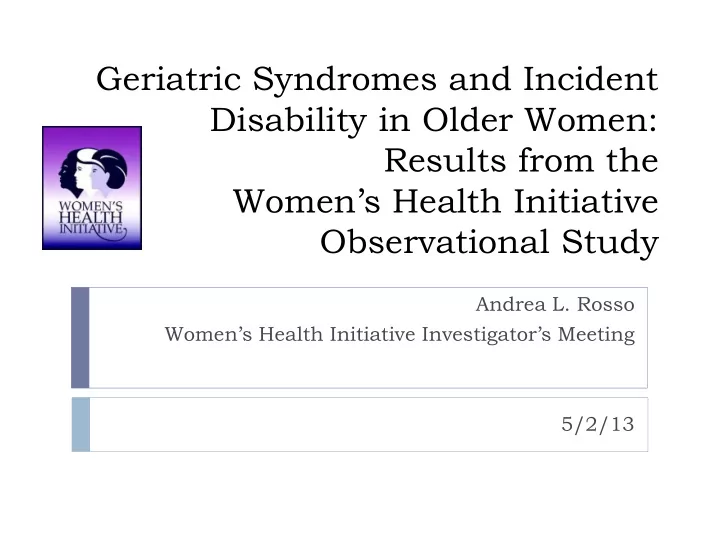

Geriatric Syndromes and Incident Disability in Older Women: Results from the Women’s Health Initiative Observational Study Andrea L. Rosso Women’s Health Initiative Investigator’s Meeting 5/2/13
Disability ~50% of Americans over 65 years disabled in 2006 9% had disability in Activities of Daily Living Associated with higher rates of Dependency Usage of medical care Hospitalization Poor physical and mental health Institutionalization Mortality
Multi-System Dysfunction Disease in older ages characterized by Multi-morbidity Involvement of multiple physiological systems Multiple underlying risk factors Complexity Fewer than half of geriatric patients have a single clinical diagnosis Multi-morbidity increases risk of disability beyond risk from individual diseases More than half of disabled have impairments in multiple physiological systems
Geriatric Syndromes Occur in older, vulnerable adults Have multiple underlying factors Involve multiple organ systems Have shared risk factors Result from loss of compensatory mechanisms Olde Rikkert et al, 2003. Nether J Med.; 61(3): 83-87.
Geriatric Syndromes Lack of consensus on inclusion of specific conditions Depressive Symptoms Bed Sores Urinary Incontinence Delirium Sensory Impairment Malnutrition Cognitive Impairment Weight Loss Musculoskeletal Problems Polypharmacy Falls Mobility Loss Dizziness Sleep Problems Syncope Functional Decline
Multi-Morbidity of Geriatric Syndromes Frequently co-occur with one another and with chronic diseases High prevalence Shared risk factors Overlapping pathways Risk factors for one another Treatments for one can increase risk for others Traditional measures of co-morbidity do not include geriatric syndromes
Geriatric Syndromes and Frailty Inouye et al, 2007. J Am Geriatr Soc.; 55(5): 780–791.
GS Burden and Incident Disability Multi-morbidity of clinical diseases is known to be a risk factor for disability onset Cross-sectional studies have shown association of multiple geriatric syndromes with physical function/disability What is the association of multi-morbidity in geriatric syndromes with incident disability? Hypothesis : Greater number of geriatric syndromes will be associated with greater risk for disability
Methods - Sample Analysis of women aged 65 years and older enrolled in the WHI Observational Study with 3 year follow-up (n=43,599) Exclusion Died by follow-up (n=1,276) Missing data (n=7,857) Baseline disability (n=874) History of or incident cancer (n=8,262)
Methods - Measurements Geriatric Syndromes – total of 10 at baseline: Depressive Symptoms (shortened CES-D/DIS; past 4 weeks) Dizziness (any past 4 weeks) Falls (≥2 in past year) Hearing Impairment (any trouble past 4 weeks) Osteoporosis (ever diagnosed) Polypharmacy (≥5 medications) Sleep Disturbance (≤5 hours of sleep/night; past 4 weeks) Syncope (past 12 months) Urinary Incontinence (≥ once/week; past year) Visual Impairment (any uncorrected trouble; past 4 weeks)
Methods - Measurements Chronic Diseases – total of 12 at baseline Congestive heart failure Diabetes Myocardial infarction Peripheral artery disease Stroke Transient ischemic attacks Alzheimer’s disease Arthritis Stomach ulcers Liver disease Asthma Emphysema
Methods - Measurement Disability – Incident inability or dependence in Activities of Daily Living (ADL) at 3 years Eating Dressing Getting in and out of bed Taking a bath or shower
Methods – Statistical Analysis Log binomial regression to calculate risk ratios (RR) and 95% confidence intervals (CI) of disability risk by number of geriatric syndromes All models adjusted for age, smoking and income Some models additionally adjusted for chronic diseases
Sample Characteristics 29,544 women included Average age 70.1 years 12.4% minority 46% had 1 chronic disease; 21% had 2+ chronic diseases 742 (2.5%) women developed ADL disability by 3 years
Prevalence of Geriatric Syndromes Geriatric Syndrome Prevalence % Syncope 2.4 Sleep Disturbance 7.7 Depressive Symptoms 8.0 Falls 11.3 Osteoporosis 11.8 Dizziness 18.6 Visual Impairment 20.5 Polypharmacy 22.0 Hearing Impairment 29.2 Urinary Incontinence 29.3
Geriatric Syndromes and Chronic Diseases 35.00% 50 Percent of Women in GS Category (Bars) 45 Percent with 2+ Chronic Diseases (Line) 30.00% 40 25.00% 35 30 20.00% 25 15.00% 20 15 10.00% 10 5.00% 5 0.00% 0 0 1 2 3 4 5+ Number of Geriatric Syndromes
Individual Geriatric Syndromes and Risk of Disability Geriatric Syndromes Adjusted Adjusted + Chronic Diseases RR (95% CI) RR (95% CI) Depressive symptoms 2.41 (1.82–3.20) 2.10 (1.58–2.79) Dizziness 2.01 (1.59–2.56) 1.73 (1.35–2.20) Falls 2.03 (1.54–2.67) 1.85 (1.41–2.44) Hearing impairment 1.46 (1.04–1.66) 1.24 (0.98–1.57) Osteoporosis 2.04 (1.56–2.67) 1.69 (1.29–2.23) Polypharmacy 2.45 (1.96–3.07) 1.95 (1.54–2.46) Sleep disturbance 1.44 (1.01–2.07) 1.27 (0.88–1.82) Syncope 1.94 (1.13–3.33) 1.77 (1.04–3.02) Urinary incontinence 1.44 (1.15–1.81) 1.27 (1.00–1.60) Visual impairment 1.74 (1.37–2.21) 1.60 (1.26–2.04)
Risk of Disability by Number of Geriatric Syndromes
Conclusions Geriatric syndromes were common in this relatively healthy sample of older women Having 3+ geriatric syndromes was associated with increased risk for disability over 3 years This association was independent of age and chronic diseases
Conclusions Mechanism is unclear Shared risk factors Frailty Loss of compensatory mechanisms Multisystem impairment Standardization needed on what is a geriatric syndrome Presence of multiple geriatric syndromes precedes disability onset and might be an important health indicator
WHI, Aging, Function, and Disability World Health Organization, 2002: http://whqlibdoc.who.int/hq/2002/WHO_NMH_NPH_02.8.pdf
Acknowledgements Charles B Eaton, MD, MS • Robert Wallace, MD, MS • Rachel Gold, PhD, MPH • Marcia L. Stefanick, PhD • Judith K. Ockene, PhD, MEd, MA • J. David Curb, MD, MPH • Yvonne L Michael, ScD • WHI participants • This work was supported by the National Institute of Aging • (R03AG031973). The WHI program is funded by the National Heart, Lung, and Blood Institute, National Institutes of Health, U.S. Department of Health and Human Services.
Recommend
More recommend